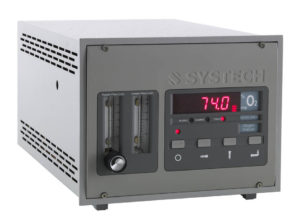Zirconia oxygen analyzer - ZR800
The zirconia analyzers (also zirconia oxygen analyzers) of series 800 stand for high reproducability of the measuring values. The measuring range covers 0.1ppm …100% O². The analyzer is suitable to do measuring in the percent ranges as well as oxygen measurement. Zirconia analyzers utilise a measuring cell from ceramics, which does not deplete.

Oxygen analyzer characteristics
The Zirconia oxygen analyzers utilise ceramics sensors which compare the oxygen level of the sample gas with the ambient air. Sensors of ceramics are non-depleting.
- T90 : 5 sec
- measuring deviations: max 2% of measuring value
- Cell lifetime: >7 years on averabe
Oxygen analyzers of series ZR800 are available in 3 various types of housings. The housings can be individally configured with plugs, handles, etc.
To get the ZR800 …,
The following accessories and configuration options are available:
- Alarm options (digital changeover contact)
- Up to 3 free programmable analogue outputs (scitchable between 0…20mA, 4…20mA and 0…10V)
- Integrated sample pump
- Integrated rectified pump
- External pump
- filters (analysis filter, coalescence filter, pre-filter,…)
- Absorber (activated carbon, hopkalite,…)
- Measuring cell insensitive against hydrocarbon
- Condensate traps
- Flow alarm
- Bypass for faster response times
- Pressure regulator
- Sample gas piping in stainless steel
- Inert gas regulation (Nitrosave)
- Autocalibration
- Accessories for mounting and installation
- 24V/DC version
Typical applicatins and benefits of the oxygen measuring device
Typical applications
- Additive manufacturing
- Aluminium industry
- MAP packaging monitoring
- Glass manufacturing
- Inert glove boxes
- Semiconductor industry
- Bond furnaces
- Inert gas regulation
- Ceramics
- Sinter and reflow ovens
- Heat treatment
- Welding plants
Benefits at one glance
- Excellent reproduceability of the measuring values
- T90 = 5 sec
- No depleting sensors
- Numerous configuation options
- Solvent-resistant
- Saving costs by inert gas regulation
- Maintenance and calibration in Germany
- Unaffected by vibration or position
- Very good readability
- User-friendly
Data sheet
Ceramic sensor
Different casings
Combinable with other instruments
You are currently viewing a placeholder content from YouTube. To access the actual content, click the button below. Please note that doing so will share data with third-party providers.
More Information